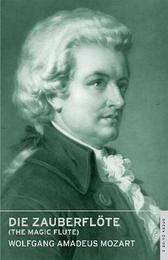
|
The Magic Flute
Paperback
Main Details
| Title |
The Magic Flute
|
| Authors and Contributors |
By (author) Wolfgang Amadeus Mozart
|
|
Edited by John Nicholas
|
|
Translated by Michael Geliot
|
|
Translated by Anthony Besch
|
| Physical Properties |
| Format:Paperback | | Pages:128 | | Dimensions(mm): Height 216,Width 135 |
|
| Category/Genre | Opera |
|---|
| ISBN/Barcode |
9780714544076
|
| Classifications | Dewey:782.1 |
|---|
| Audience | |
|---|
| Illustrations |
Illustrations
|
|
Publishing Details |
| Publisher |
Oneworld Classics Ltd
|
| Imprint |
Overture Publishing
|
| Publication Date |
7 February 2011 |
| Publication Country |
United Kingdom
|
Description
With his last opera Mozart created a piece of theatre which defies categorization. In theory it is a Singspiel, a mixture of songs and dialogue, in which the spectacular effects and comedy fit naturally: they appeal today as much as they did when it first opened in popular Viennese theatre two hundred years ago. Rodney Milnes recalls some of the other pieces playing at the time, such as Kaspar the Bassonist, or The Magic Zither. On the other hand, it belongs to a tradition of Enlightenment texts in which a young Prince, destined to be a ruler, learns from his adventures how to behave wisely as a social being. This is a re-working of the Orpheus myth, in the context of the Age of Reason and Freemasonry. David Cairns describes the many beauties of the score in loving detail, taking the reader through the complex plot, to clarify and interpret it. Famous commentaries by Goethe, Berlioz, E.T.A. Hoffmann and G.B. Shaw reveal their enthusiasm for the opera. A useful and unusual feature of this guide is the complete dialogue, in German with an English translation, which is often badly cut in performance. Like so many fairy-tales, The Magic Flute repays careful attention: its music has a charm to inspire the child in every listener.
Author Biography
Wolfgang Amadeus Mozart (1756-1791) was born in Salzburg, and began composing at the age of five. His subsequent prolific output included the great operas of his maturity, Le nozze di Figaro, Don Giovanni, Cosi fan tutte and Die Zauberflote."
|